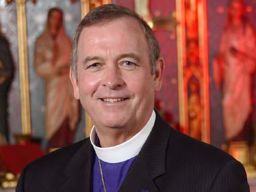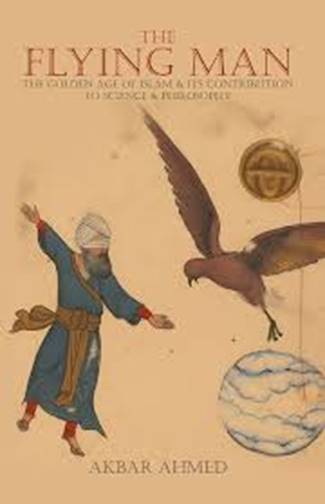
“I must say however that once again Ahmed has written a book that must be read by as many people as possible who can still find joy and wisdom in reading....and who have a taste for understanding the role of Islam in its Golden Age and its impact on the West, Interfaith Dialogue and those who serve our country as political leaders...especially now that we are facing a very difficult time as a divided and somewhat illiterate populace.” - The Right Reverend Bishop John Bryson Chane
The Flying Man, The Golden Age of Islam and Its Contribution to Science and Philosophy
By The Right Reverend Bishop John Bryson Chane
Washington, DC

The Flying Man, The Golden Age of Islam and Its Contribution to Science and Philosophy (Beacon Books, 2024, London) by Dr Akbar Ahmed is a must-read for anyone who wonders about the future of global stability and the ultimate condition of all humanity. Much has been written about Islam as a provocateur of violence and an outlier from the two other Abrahamic Faiths, Judaism and Christianity. Too often we look at Islam through a Western colonial, theological, and cultural lens based on the assumptions that Western culture and monotheistic religious traditions and the extensive scholarship of Judaism and Christianity are far more historically and morally advanced and truthful than those of Islam. Dr Ahmed’s book is a wake-up call to understand the fallacy of such thinking.
The Golden Age of Islam occurred between 622 AD to1258 AD. It was an incredible time when Muslim scholars aided by the patronage of Caliphs and Monarchs generated significant discoveries and advancements in the sciences, arts, the humanities, studies of the nature of God, the human soul and creation.
Muslim scholars were heavily influenced by ancient, classical Greek philosophy, medicine, theology, the humanities, the sciences and nature espoused by Aristotle, Plato and Hippocrates. Avicenna, an eminent Persian polymath was heavily influenced by Greek scholarship, philosophy and thought. He was a shining light in the world of Islam being a gifted scholar contributing to the multiple fields of medicine, navigation, astronomy, zoology, botany, astrology, mathematics, philosophy and the humanities. Other significant Persian scholars impacted by the scholarship and learning of the time were Jamshid al-Kashi, astronomer, and mathematician and Al-Ghazali, who following the death of the Prophet Muhammad, became the foremost authority of Islam, its theology and jurisprudence. The geographical proximity of Persia to the ancient lands of Greece and its scholars provided access for Islamic scholars and philosophers to engage with and translate the written works of Aristotle, Plato and Socrates from classical Greek into Persian and Arabic.
It was during the Golden Age of Islam that Islamic scholars and their work were able to contribute to lifting Europe out of the Dark Ages following the fall of the Western Roman Empire, a period of deep economic, intellectual and cultural decline. It was the exceptional work and study of Persian academics and philosophers that heavily influenced the renowned Rabbi Maimonides. He was a proponent of the thinking that the body is basic, dealing with material and physical aspects of human life, and that to embrace one’s Faith one must also possess knowledge, intelligence allowing no room for ignorance, a maxim of Socrates. Socrates’ teaching about Democracy was that it could not survive if it was left in the hands of and embraced by an uneducated populace. Maimonides and his scholarship as a brilliant religious academic and Rabbi is still regarded as the iconic bridge builder joining the three monotheistic Faiths, Judaism, Christianity and Islam together under the banner of the dignity of difference.
The Golden Age of Islam was a time when the emergence of universally held moral imperatives and values

contained in the core teaching of all three Abrahamic Faiths was becoming a reality. Belief in one God and possessing faith in that belief, loving God and neighbor as God loves us, possessing mercy and compassion, kindness and care for those who are in physical proximity with us and who are not of our faith, adhering to the principle of equal Justice under the Law, forgiveness, respecting the human dignity of the “other” regardless of their faith, ethnicity, gender or social status were all gifts from the Islamic scholars of the age.
The Qur’an’s words from the Prophet Muhammad call for the faithful to express tolerance, kindness, respectfulness, charity towards those in need and a love of God and humankind. God possesses the final judgement of one’s behavior toward others. God loves justice and those who seek it especially for those who are different. One may forgive without loving, but one cannot love without forgiving and there is no compassion in love, but love is much more than simply bearing the burden of others.
I must say however that once again Ahmed has written a book that must be read by as many people as possible who can still find joy and wisdom in reading....and who have a taste for understanding the role of Islam in its Golden Age and its impact on the West, Interfaith Dialogue and those who serve our country as political leaders...especially now that we are facing a very difficult time as a divided and somewhat illiterate populace.
So much scholarly work and enterprise contained in the shared theologies of Islam, Christianity and Judaism by scholars and philosophers has generated a set of core values that define acceptable human behavior within the complexity of engaging the “other” in a very divided and too often violent world. The work of Dr Ahmed raises a question about if we are now living in a global values vacuum where theology is being processed and weaponized by politics and by far too many believers who at best are illiterate when it comes to really understanding and living core values of behavior as espoused in the teachings contained in the Holy Books of Islam, Christianity and Judaism. Has secularism and unbridled technological change empowered people to accept bad behavior in a badly behaving world? And if this is so, then who will be the contemporary scholars, philosophers and theologians whose shared academic work will be translatable and transformational for those who claim to follow the Law and the Prophets, the teachings of Jesus and Muhammad but who somehow continue to be held prisoner by the values vacuum of the 21 st Century.
(The Right Reverend John Bryson Chane, D.D.
8 th Bishop of The Episcopal Diocese of Washington DC Bishop Chane was head of the Diocese of Washington DC and after 9/11 played a key role in promoting interfaith harmony.)

